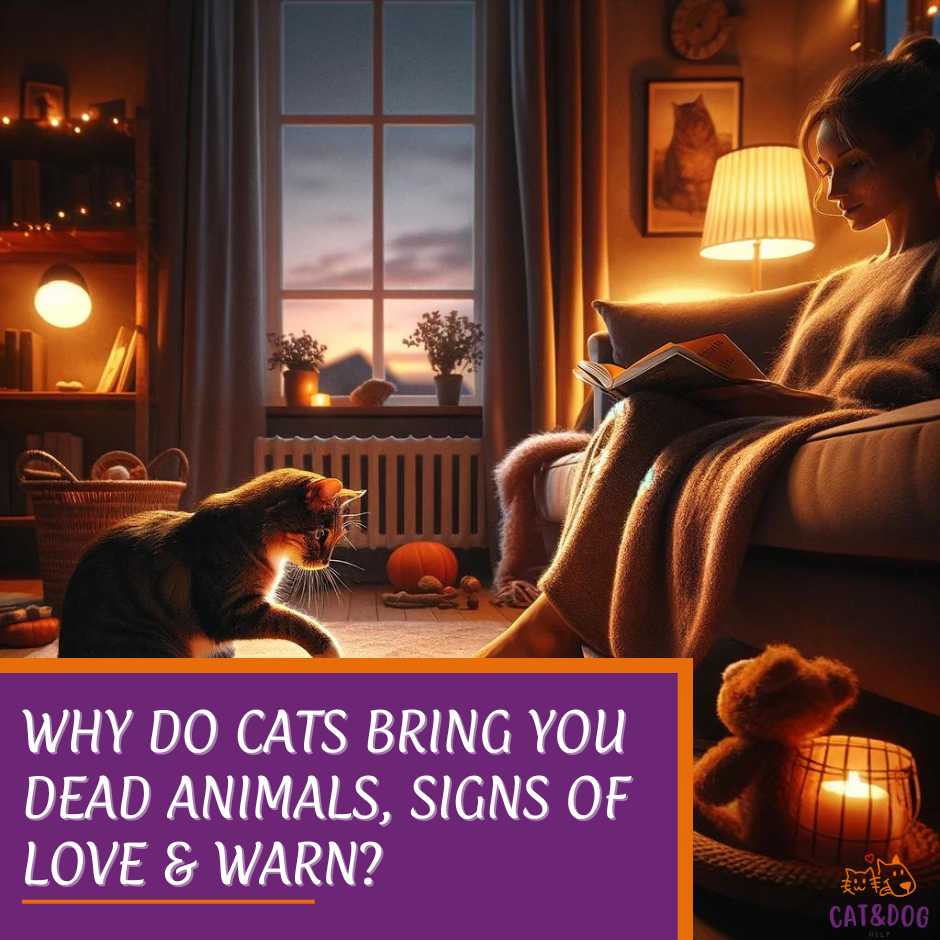Cats are well known for their predatory instincts and their inclination to hunt, even though many live as cherished household pets who don’t need to scavenge for their next meal. (1)
But have you ever wondered why cats bring you dead animals and present you with a lifeless bird or mouse? This unsettling act can be perplexing, to say the least, leaving many cat owners scratching their heads in confusion.
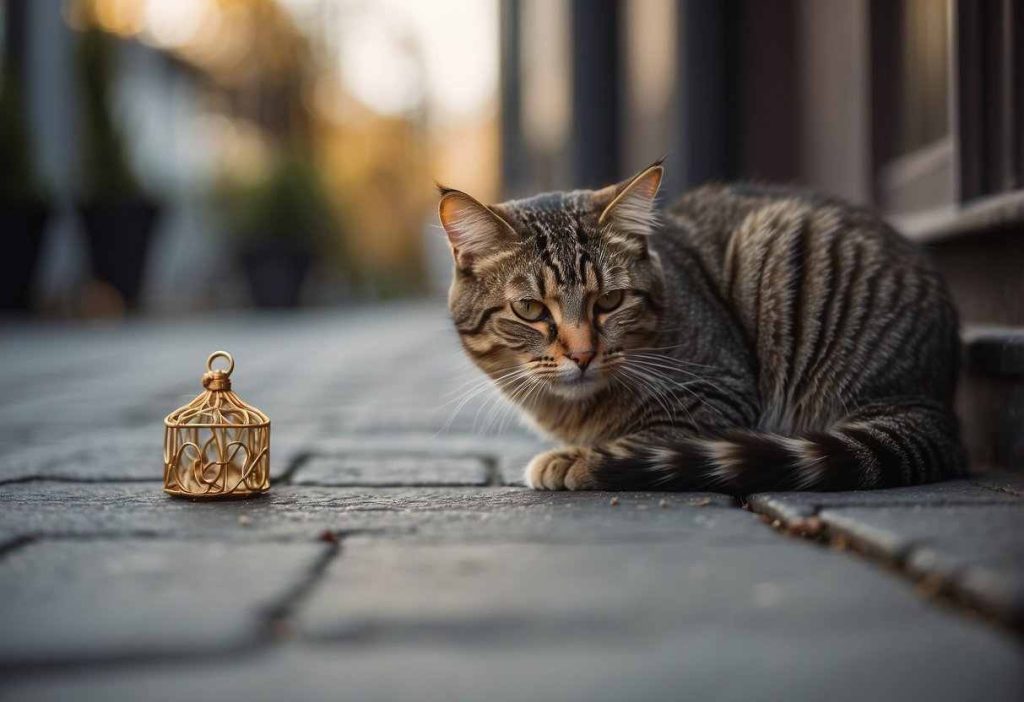
This behavior is deeply rooted in feline nature and traces back to the days before domestication when survival hinged upon a successful hunt.
For indoor cats, those instincts haven’t faded, and they often engage in this practice as a way of sharing their ‘catch of the day’ with those they consider part of their family.
It can also be a sign that your cat is teaching you to hunt as she would do for her offspring.
Understanding this behavior can help you appreciate the complex emotional intelligence of cats and may even deepen the bond between you and your pet.
Key Takeaways
- Cats have an instinct to hunt, leading them to bring dead animals to their owners.
- Such behavior may represent a cat’s way of providing for its family or teaching them to hunt.
- Recognizing this behavior can strengthen the owner-cat relationship and offer insight into a cat’s emotional world.
Why Do Cats Bring You Dead Animals?
Unraveling the Mystery Through Science
Why do cats insist on presenting us with their wildlife conquests? The answer lies within their instincts. (2)
Cats are hunters by nature, and the act of catching prey, be it small mammals or birds, is a means for survival outdoors.
When domestic cats roam the environment, often unhindered by a leash, their predatory skills kick in.
Cats have become part of our families, yet their behavior remains rooted in their wild ancestors.
When they bring dead animals home, it can be seen as a form of mental stimulation and exercise they still need, despite living amongst humans.
Instead of the outdoors, cat owners may provide enrichment toys, such as catnip-filled mice or feather wands, to engage their pet’s natural hunting drive.
Communication and Social Bonds
Cats might be trying to teach their human companions how to hunt, much like a mother cat would do with her kittens.
They might see their owners as inept hunters and thus bring them prey as a means to help sustain them.
This peculiar behavior can also be a cat’s way of sharing their success or creating a shared bond.
A cat’s presentation of a dead animal can be a sign of trust and affection, an odd compliment to their owner.
To foster this bond without welcoming dead critters, owners should spend quality outdoor time with their pet using a leash and collar, or construct a safe catio for supervised enjoyment of the outdoors.
Providing a cat tree or enrichment toys may also redirect this hunting energy indoors, satisfying their need for exercise and mental stimulation without harming local wildlife.
Introduction to Feline Hunting Behavior
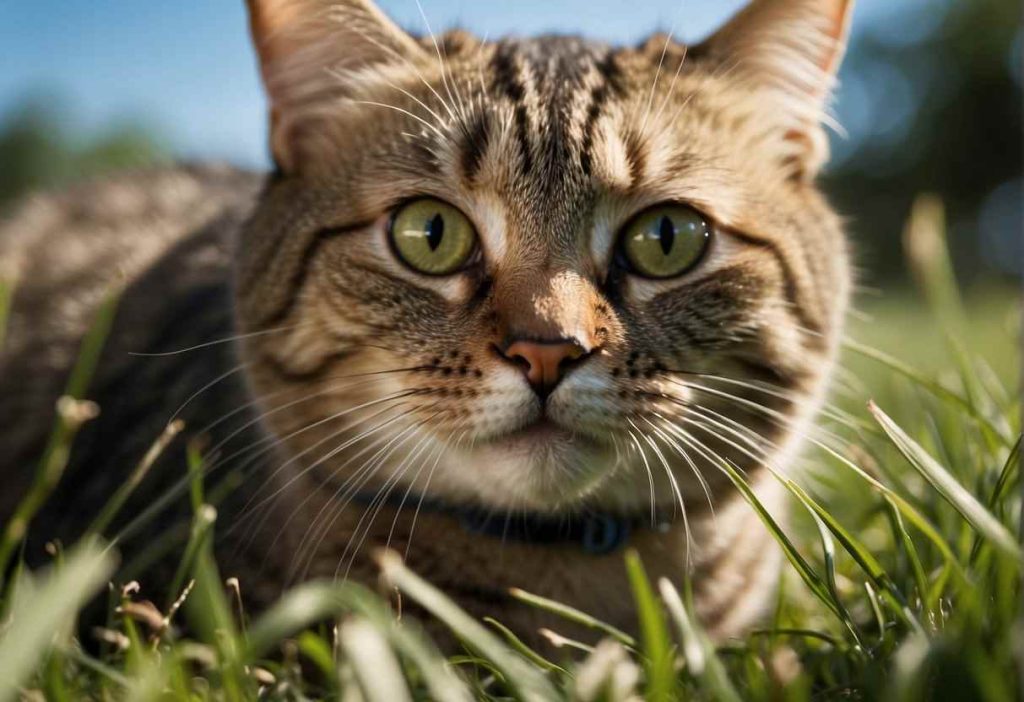
The Instinct to Hunt
It all boils down to their natural propensity to hunt.
Cats, large and small, have inherited the instinct to hunt from their ancestors. This primal behavior is deeply rooted in their DNA.
Evolutionary roots of hunting in cats: It’s fascinating to trace this behavior back to their wild ancestors. Initially, survival and the need to eat drove them to perfect their hunting skills.
This instinct is so strong that even a well-fed housecat can’t resist the urge to stalk and capture its prey.
Differences in hunting behavior among cats: One might notice differences in hunting tendencies among various cats. (3)
These variances often depend on the environment the cat was raised in and it’s level of exposure to the wild.
Cats that have been feral or have spent more time outdoors may demonstrate more prolific hunting skills. Conversely, indoor cats often exhibit these behaviors through play, using toys as substitutes for real prey.
Cats’ hunting prowess is a complex interplay of inherited instinct and learned behavior.
While the sight of a lifeless critter on your doorstep might be unsettling, it’s essential to understand that your pet is simply acting on a natural impulse.
They are often taught to hunt by their mothers, who bring back incapacitated or dead prey to teach their kittens how to handle and eat their food.
So the next time your kitty comes bearing gifts, remember, they’re just being the adept hunters they were born to be!
Responding to Your Cat’s Gifts
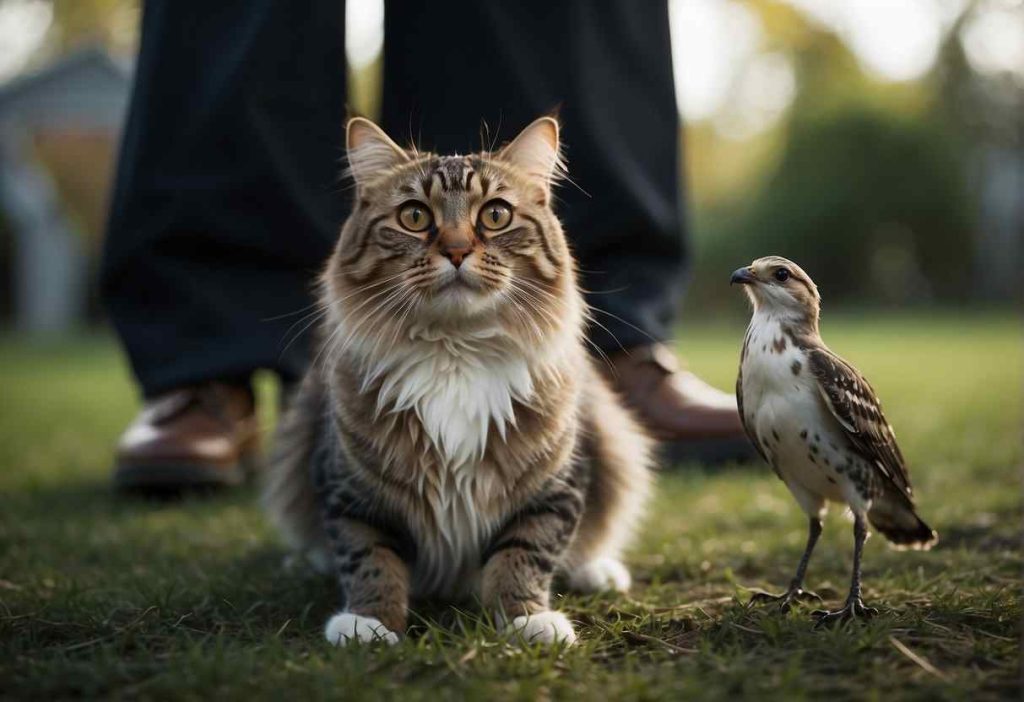
Acknowledging and Redirecting the Behavior
Ever found yourself on the receiving end of a not-so-pleasant ‘gift’ from your feline friend? She’s not trying to gross you out; it’s her way of teaching you to hunt. But how do you say ‘thanks, but no thanks’?
- Show Appreciation: Give her a gentle pet or a soft-spoken “thank you,” to acknowledge her efforts.
- Redirect the Instinct: Engage them with:
- Feather toys
- Laser pointers
- Interactive feeders
They’re like the video games of the cat world — keeping their paws busy without the mess!
Enhancing Safety and Health
So, you’ve got a dead mouse on your hands — what now?
Safe Disposal Guide:
- Suitable Gloves: Grab a pair to keep your hands clean.
- Wrap the Gift: Use paper or plastic for the pickup.
- Seal in a Bag: Ensure it’s airtight.
- Trash Disposal: Place it in an outside bin.
Finally, a quick scrub-up for hands and any surfaces involved is a good call.
Preventing Mishaps:
- Vaccinations: Keep them up to date.
- Flea Control: Avoid those pesky hitchhikers.
- Veterinary Check-Ups: Regular visits are a must for a healthy predator.
Your fluffy assassin’s safety is paramount, and so is yours!
Building a Deeper Connection with Your Cat
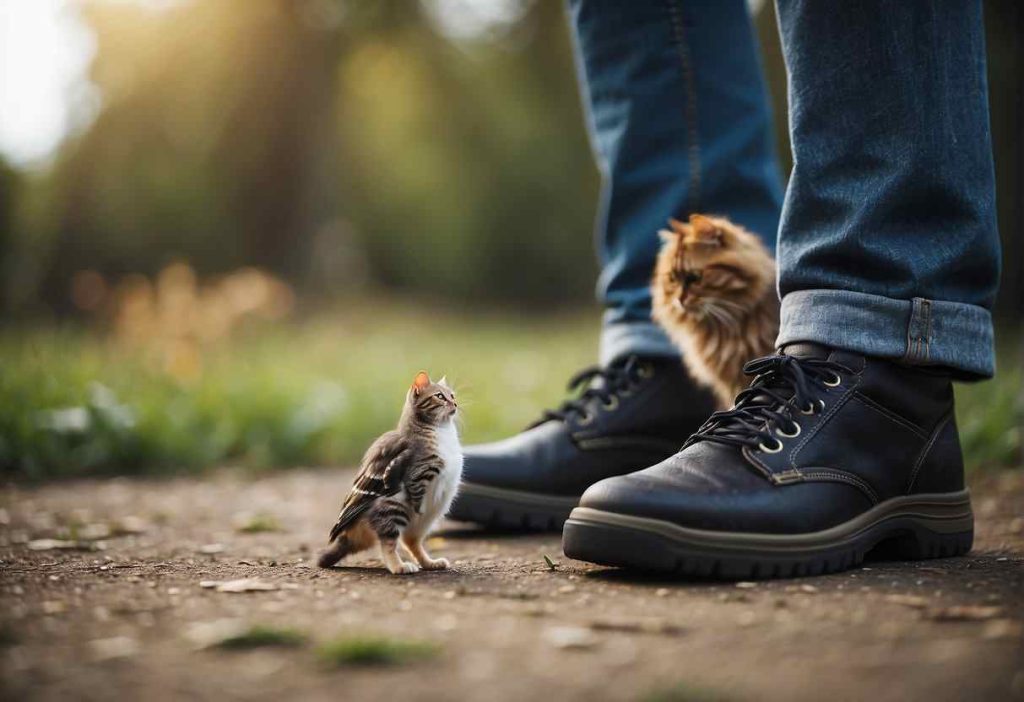
Shifting Perspectives: Seeing the World Through Your Cat’s Eyes
Understanding their behavior is a stairway to build a deeper rapport.
Cats, with their complex behaviors, often leave their owners perplexed. It starts with putting oneself in their paws and perceiving the environment from their viewpoint. Here are exercises to assist:
- Spend time observing: Watch when your cat hunts or plays. This helps to understand her instincts.
- Play along: Engage in hunting games with toys. It’s playful yet insightful.
A cat-friendly home matters greatly. Here’s how to enrich theirs:
- Provide high perches and hiding spots. Cats love a good vantage point.
- Incorporate scratching posts to cater to their scratching habit.
Practical Tips for a Stronger Bond
Bonding with a cat involves mutual respect. It’s about saying, “I get you,” without words. Strategies include:
- Respect their space: Cats cherish their alone time.
- Be consistent with affection: Some cats prefer predictability in cuddles and pets.
Cats thrive on routine. Rituals aligned with their natural behaviors strengthen bonds. Here’s what owners can do:
- Feeding rituals: Feed at the same time daily to create a sense of security.
- Grooming: Regular brushing sessions are not just for cleanliness but also for bonding.
Remember, the goal is to enhance the relationship while staying authentic to their nature. It’s about blending their world with ours to create harmony and understanding.
Advanced Strategies for Managing Hunting Behavior
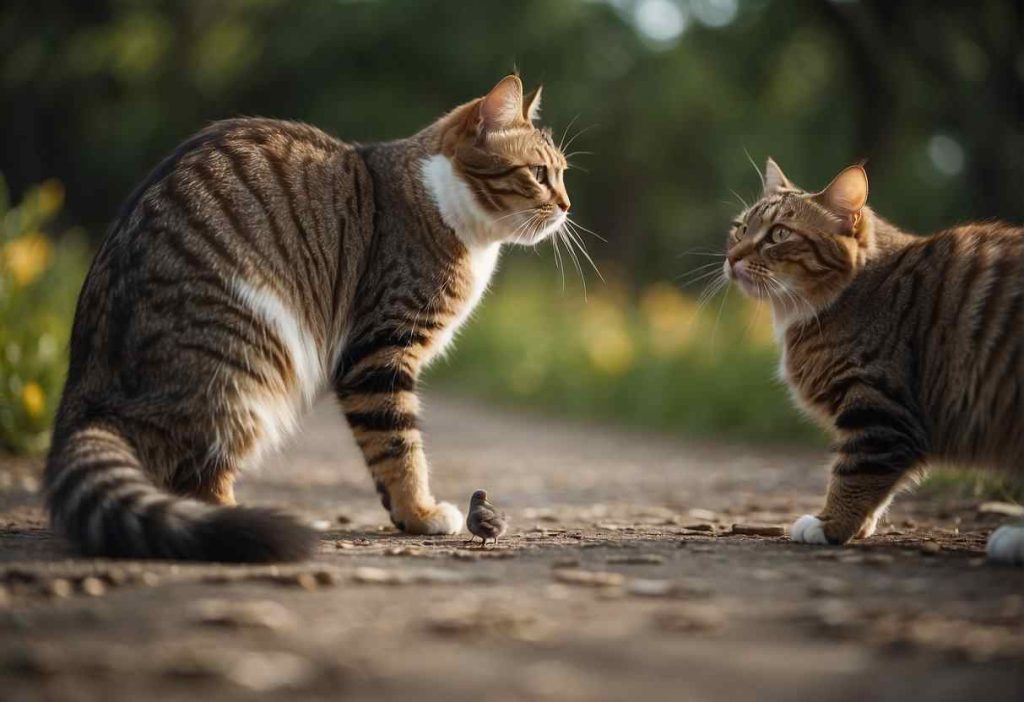
Tailored Behavioral Management Techniques
Here’s how:
- Observe their playstyle: Does she stalk quietly or does he pounce without warning? Customize playtime to match.
- Interactive toys: Get toys that mimic prey movements.
- DIY Fun: Try crafting toys with feathers or fabric. Homemade is heartfelt, right?
- Provide climbing spaces and hiding spots to simulate a more natural environment.
Outdoor Exploration vs. Safety
Are the great outdoors calling your kitty? They love a bit of adventure, but safety is key.
- Harness training: A cat-friendly harness can allow for supervised exploration.
- Enclosed spaces: Consider a catio — yes, that’s a patio for your cat.
- Employ GPS collars or microchip trackers to keep tabs on your furry explorer.
Remember, while their little “gifts” can be shocking, it’s just their way of showing love and sharing their ‘hunt’ success.
By keeping them active and entertained, you turn that hunter’s energy into positive playtime – and maybe keep those little surprises to a minimum. Who could say no to a happier, healthier cat?
Understanding Your Cat’s Emotional Intelligence
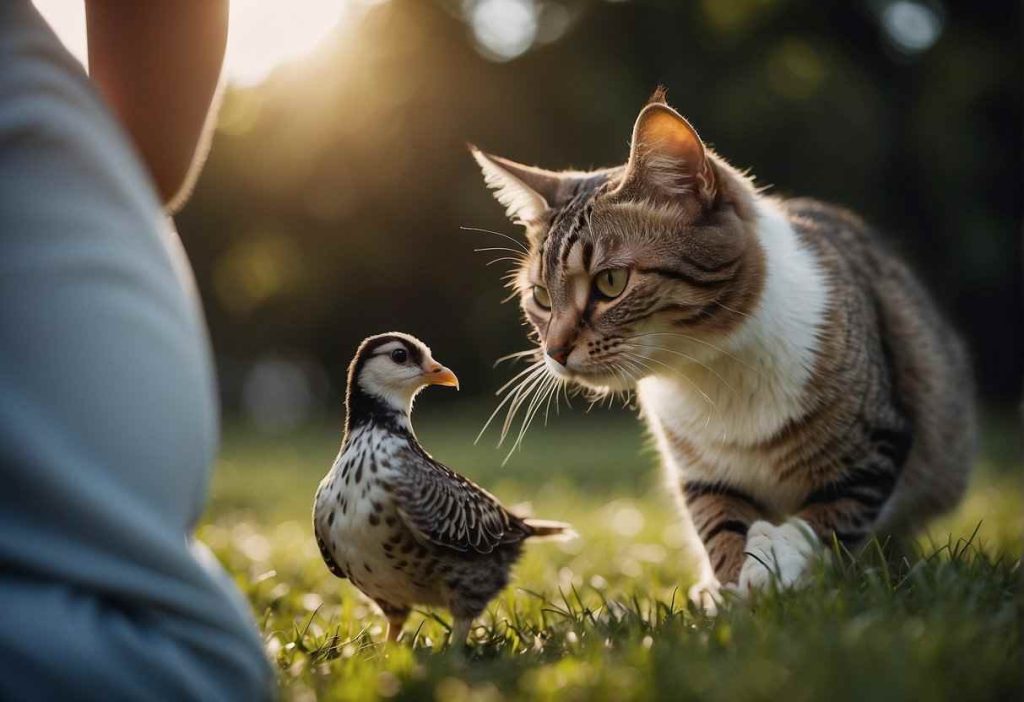
The Emotional and Social Aspects of Gift-Giving
Cats are often seen as solitary hunters, but they show a surprising depth of social understanding through their actions. (4)
When a cat brings a dead animal to its human, this “gift-giving” can be a sign of trust and bonding.
One might wonder what goes through their furry heads. Is it love, respect, or something else?
They perceive their human companions as a family or a part of their group, and this offering is a way to share their success or teach their valued family members how to fend for themselves.
- Trust: Bringing a gift is a sign of trust.
- Connection: It indicates a close bond.
- Generosity: Sharing their “catch” shows they care.
The Spectrum of Hunting Behaviors
The driving forces behind bringing you these little tokens can be varied:
- Teaching: They might be trying to teach you how to hunt, as they would do for their kin.
- Playing: Sometimes, it’s simply a game, integrating you into their playtime.
- Sharing: Or it could be a gesture of sharing their bounty with you.
So, when the next “gift” arrives, try to see it from their perspective.
They’re not just being hunters; they’re communicating.
They’re saying, “Look what I can do!” or “You seem like you could use a hunting lesson!”
- Teaching Moment: They might think you’re not the best hunter.
- Game Time: Your living room is the new savanna.
- Dinner’s on Me: Today, it’s their turn to provide for the family.
Understanding these behaviors highlights the complexity of your cat’s emotional intelligence and their ability to form social bonds.
They’re more than just pets; they’re teachers, friends, and family members, trying to express their innate behaviors in a human-centric world.
Now, aren’t you curious about what your cat is trying to say with their next gift?
Quick Recap
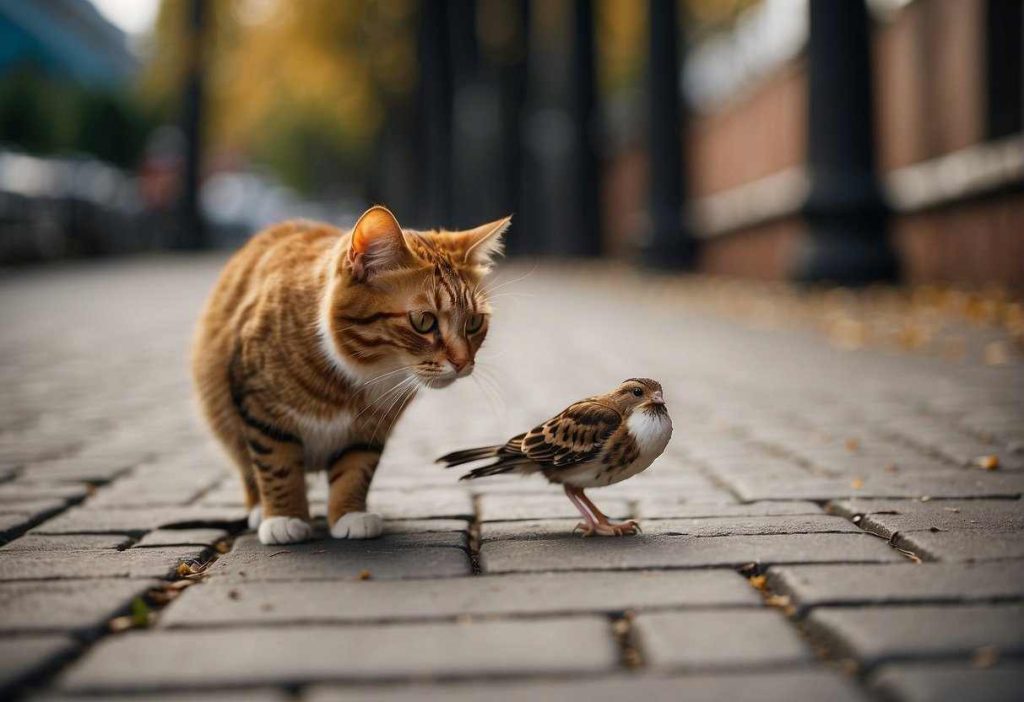
They’re not gifting you a macabre present or playing a prank. Rather, these actions stem from instinctual behaviors rooted in their wild ancestry. (5)
- Innate Instincts: They hunt due to their predatory nature, a trait ingrained in their DNA.
- Teaching Techniques: Sometimes, it’s their way of teaching you to fend for yourself. They might think you’re not quite up to scratch in the hunting department.
Ever feel like they’re praising your capacity to care for them, despite the gruesome nature of their gifts? Think of it as their quirky way of saying “thanks.”
- Appreciative Actions: Your reaction to their offerings can influence their behavior. A neutral response might reduce this behavior.
- Respect and Understanding: Acknowledging this natural behavior is key to nurturing a compassionate bond with your cat. No, they’re not spiteful little critters; they’re just doing what cats have done for millennia!
So next time you find an unwanted critter by your door, remember:
| Behavior | Interpretation | Owner Response |
| Hunting | Expressing natural instincts | Remains calm |
| Gifting Prey | Attempting to teach or show appreciation | Neutral reaction |
| Frequent Hunting | Seeking stimulation or fulfilling needs | Engage in play |
It’s all about cohabiting with understanding and a hint of humor. They aren’t the newest underworld delivery service; they’re your little lion with a loving heart and a wild side. Keep the bond strong by respecting their feral finesse!
Frequently Asked Questions
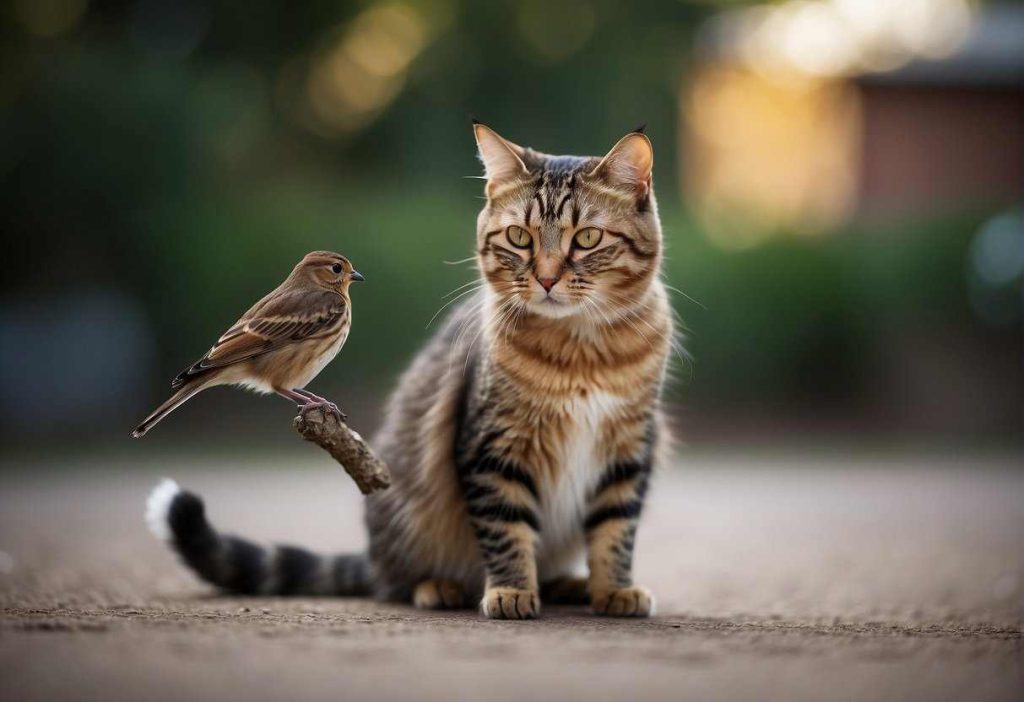
These FAQs dive into the roots of this behavior, typical responses, and handling strategies for pet owners puzzled by their feline’s hunting habits.
Why does my cat bring me dead animals?
Cats are natural hunters, and they often bring dead animals to their owners as a form of learned behavior.
They may be trying to teach their human ‘kittens’ how to hunt, just as they would with their actual offspring.
Is it normal for my cat to bring me dead animals?
Yes, it’s perfectly normal for cats to bring dead animals to their owners.
This behavior is a remnant of their wild instincts, even though they’ve been domesticated for thousands of years.
How should I respond when my cat brings me a dead animal?
When a cat brings you a dead animal, respond with gentle praise and then dispose of it safely.
They’re treating you as part of their family and are either bringing a gift or attempting to teach you to hunt.
Can I stop my cat from hunting?
Completely stopping a cat from hunting is challenging since it’s an instinctive behavior.
However, keeping them indoors, especially during dawn and dusk when they’re most likely to hunt, can reduce their opportunities.
How can bringing dead animals affect my cat’s health?
Bringing dead animals can expose cats to parasites and diseases. It’s important to ensure they are regularly dewormed and vaccinated to minimize health risks.
Is it safe to let my cat eat the animals it catches?
It’s generally not safe for cats to eat the animals they catch as they may contain diseases or parasites. It’s better to provide them with a controlled diet from pet-safe sources.
How can I safely dispose of the dead animals my cat brings home?
Dispose of the dead animals by wearing gloves, placing the animal in a plastic bag, and throwing it away in an outside trash bin.
Always wash your hands thoroughly after handling any dead animal.

